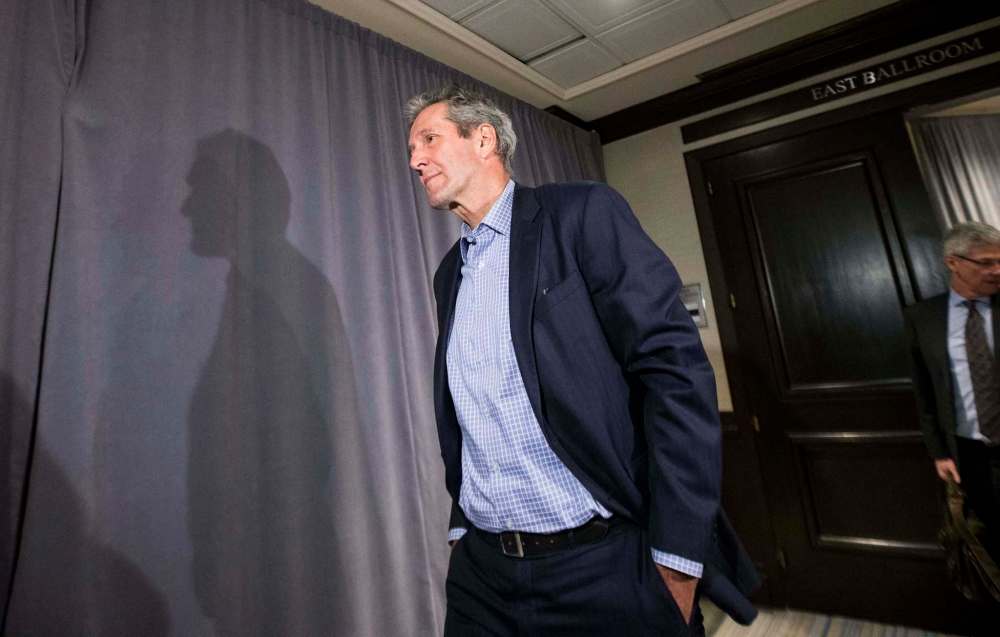Premier all over the map on carbon tax
Advertisement
Read this article for free:
or
Already have an account? Log in here »
To continue reading, please subscribe:
Monthly Digital Subscription
$0 for the first 4 weeks*
- Enjoy unlimited reading on winnipegfreepress.com
- Read the E-Edition, our digital replica newspaper
- Access News Break, our award-winning app
- Play interactive puzzles
*No charge for 4 weeks then price increases to the regular rate of $19.00 plus GST every four weeks. Offer available to new and qualified returning subscribers only. Cancel any time.
Monthly Digital Subscription
$4.75/week*
- Enjoy unlimited reading on winnipegfreepress.com
- Read the E-Edition, our digital replica newspaper
- Access News Break, our award-winning app
- Play interactive puzzles
*Billed as $19 plus GST every four weeks. Cancel any time.
To continue reading, please subscribe:
Add Free Press access to your Brandon Sun subscription for only an additional
$1 for the first 4 weeks*
*Your next subscription payment will increase by $1.00 and you will be charged $16.99 plus GST for four weeks. After four weeks, your payment will increase to $23.99 plus GST every four weeks.
Read unlimited articles for free today:
or
Already have an account? Log in here »
Hey there, time traveller!
This article was published 20/01/2020 (2153 days ago), so information in it may no longer be current.
Premier Brian Pallister’s love-hate relationship with carbon taxes took another turn Monday.
More than a year after the premier flip-flopped by cancelling a planned Manitoba levy, Pallister now says he’s willing to consider such a tax again.
Pallister unveiled his government’s climate and green plan in October 2017, which included a $25 per tonne carbon tax. The plan, which took swipes at the former NDP government’s environmental record, was more of a political document than a scientific one. It offered few concrete plans to significantly reduce greenhouse gas emissions.

The climate plan claimed a $25/tonne tax would cut emissions by more than one megaton over a five-year period.
There’s no evidence in the world that a $25/tonne carbon tax (about five cents on a litre of gasoline) would reduce emissions by that amount; Manitoba has had a $20/tonne federal carbon tax since April, and there’s no evidence it has reduced emissions by any amount. The province emitted 22 megatons of greenhouse gases in 2017.
Pallister was a fan of the carbon tax in 2017, claiming it would help reduce emissions — even at the low rate he had proposed. He said if Manitoba didn’t have its own tax, the federal government would impose one on Manitoba.
“If we say no, we get Trudeau,” he repeated, ad nauseam.
The premier was right. The federal Liberals made it clear from the beginning they would impose a “backstop” in provinces that didn’t have a $50/tonne tax by 2022. There was no wiggle room. After fierce opposition at home over his “made-in-Manitoba” plan, Pallister ditched it a year later. His government launched a lawsuit against Ottawa’s tax, an action still pending.
Pallister has been hot and cold on the idea of a carbon tax ever since. He’s flirted with the idea of bringing one in, but has also criticized Ottawa for imposing its own.
On Monday, in a surprise move, the premier announced he was prepared to negotiate a new climate plan with Ottawa that may include a provincial carbon tax. When asked if he would accept an escalating tax (like Ottawa’s) or a tax higher than $25/tonne, he didn’t rule it out. He said, however, he preferred a flat tax.
In other words, when it comes to carbon taxes, the premier is all over the map. He doesn’t quite know what he wants. Some days he likes it, other days he doesn’t.
It’s highly unlikely the federal government would entertain anything less than a $50/tonne carbon tax by 2022 in Manitoba. It has been firm on that. In fact, it has hinted it may go higher after 2022. (Federal Environment Minister Jonathan Wilkinson has said no decision will be made for at least two years.)
Most studies show a carbon tax would have to be far higher than $50/tonne to have any measurable effect on emissions. The Ecofiscal Commission reported in November that Canada could hit its emission targets if it quadrupled its carbon tax to $210/tonne by 2030 (about 40 cents on a litre of gasoline).
What effect such a massive increase would have on the economy, including on inflation, remains a major sticking point.
What is certain is Pallister’s $25/tonne tax would have virtually no effect. Even if the feds were willing to meet the premier halfway at $35 to $40 per tonne (which they almost certainly wouldn’t), it would have little, if any, effect on emissions.
So why is Pallister floating this idea, knowing full well Ottawa would accept nothing less than $50/tonne by 2022? Perhaps he wants to say he tried to negotiate with the feds — and once again they rejected Manitoba’s plan.
Maybe he’s just trying to deflect attention away from the fact his government has done little to reduce emissions, beyond closing a barely used coal plant already slated to be mothballed.
Whatever the reason, it won’t stop Ottawa from jacking up its carbon tax to $50/tonne by 2022.
Maybe Pallister will be a full-fledged supporter of the tax by then.
tom.brodbeck@freepress.mb.ca

Tom has been covering Manitoba politics since the early 1990s and joined the Winnipeg Free Press news team in 2019.
Our newsroom depends on a growing audience of readers to power our journalism. If you are not a paid reader, please consider becoming a subscriber.
Our newsroom depends on its audience of readers to power our journalism. Thank you for your support.







